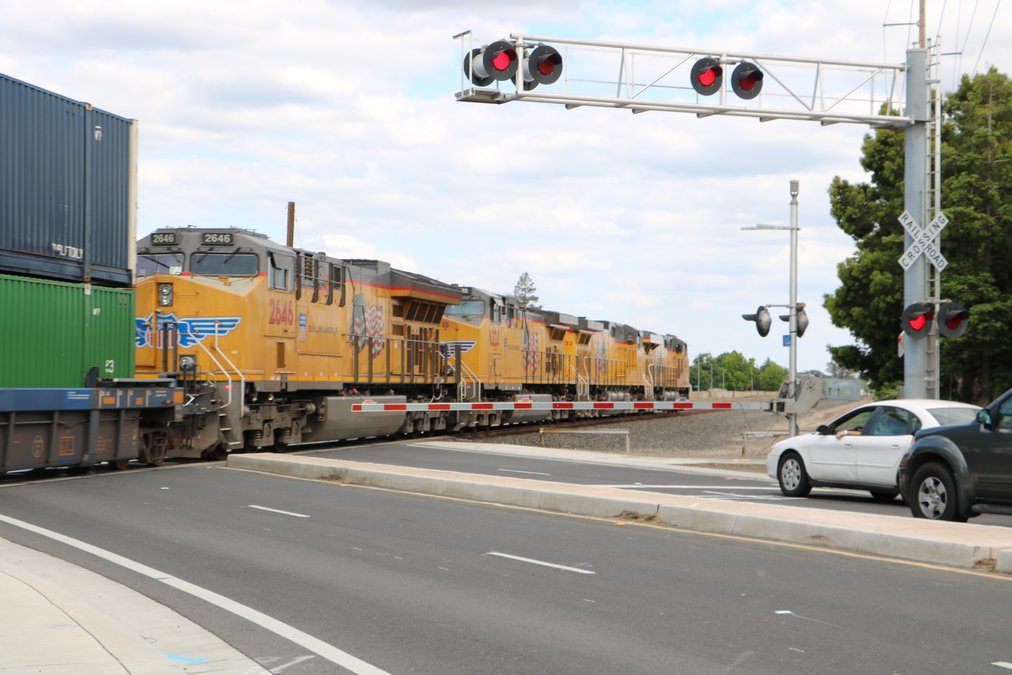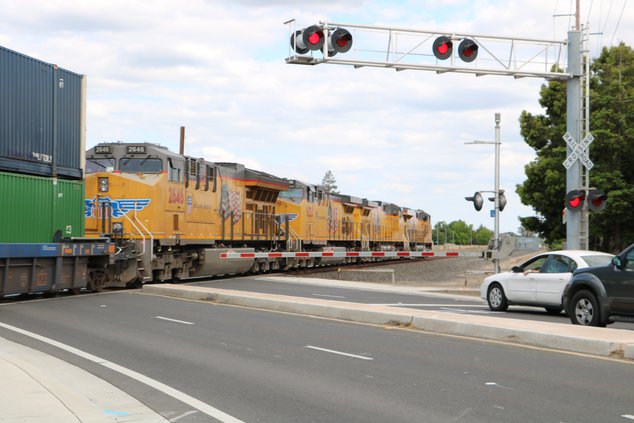It likely wasn’t legal but then again under state law neither is a train blocking a crossing for more than 10 minutes based on rules established by the California Public Utilities Commission.
Motorists northbound on Industrial Park Drive — frustrated that a Union Pacific train that rolled to a stop at 2:10 p.m. Monday was still blocking the crossing more than 12 minutes later — started backing up one-by-one.
Eventually, every vehicle driver trapped by the median between the crossing and Van Ryn Avenue was able to flip a U-turn.
The train, for the record, was still there at 2:35 p.m.
This, of course, is nothing new to motorists who drive the Spreckels Avenue-Industrial Park Drive corridor.
The crossing is blocked multiple times a day, sometimes as long 30 minutes.
It’s been happening for years. And it will get worse as ACE trains start rolling to Ceres as well as increased freight traffic UP has projected over the next 10 years.
The siding, used to allow one train to pass another, was in use long before the Spreckels Road crossing — which was a pot-hole riddled washboard country road T-intersecting into Moffat behind Spreckels Sugar — was converted into a four-lane arterial nearly 18 years ago.
Traffic went from perhaps two vehicles an hour to thousands each day.
The city might want to lodge a formal complaint against Union Pacific with the CPUC.
It might get the ball rolling on an obvious — and relatively low-cost solution — compared to a $30 million bridge overcrossing or undercrossing. That solution is moving the siding further south toward Ripon.
There is a California Public Utilities Commission rule stating that “a public grade crossing which is blocked by a stopped train . . . must be open within 10 minutes.”
However, according to the Federal Railway Authority, “the issue of a state’s authority to legislate or regulate blocked crossings is highly contentious and still being defined in the courts.”
“Railroads have on occasion mounted ‘pre-emption’ defenses, citing FRA regulations and other federal requirements which they believe take precedence over state laws or local ordinances, “an FRA fact sheet stated. “Where there is a conflict between state and federal rail safety requirements, the courts have found the state law to be pre-empted and, thus, unenforceable.”
You would think, though, the CPUC would want to find a way to make the siding relocation happen even if it requires putting up some money.
That’s because the CPUC is embracing rules dealing with climate change that are based on air quality concerns which dozens upon dozens of idling cars and trucks sitting for 20 minutes or more each day contribute significantly to making worse.
Campos not part of
cannabis advisory
board for Embarc
Melissa Campos wants to make it clear.
She is not on the advisory board for Embarc, a firm that wants to secure one of three storefront cannabis permits for the City of Manteca.
Campos shares she actually turned down the offer when she was approached.
That, however, apparently didn’t keep Embarc from listing her name among others as part of a PowerPoint presentation last month to the Manteca Rotary Club.
The presentation by Embarc co-founder Dustin Moore listed advisory board members aa Jeff Liotard, Mt. Mike’s Pizza co-owner; Steve Jessup, Manteca Chamber of Commerce president; Nick Obligacion, retired Manteca police chief, and Melissa Bugarin-Campos, Manteca businessperson.
Also on the advisory board in the role as its chair based on her being tapped by Embarc to be the local owner is Christina Keefhaver — the CEO of Give Every Child a Chance.
Keefhaver will receive equity or a share of the profits for being the firm’s “boots on the ground” in Manteca.
The advisory board, should Embarc obtain one of the permits, will help decide how funds generated by the 1 percent set aside of gross receipts that will be spent on Manteca endeavors.
Great Wolf lures
benefit luncheon
for Tracy non-profit
There are signs emerging left and right that Manteca’s strategy of becoming a family entertainment draw for the NorCal Metroplex, but also as a gathering place for the region, is pickup up steam.
The latest example is the decision by the Tracy-based Chest of Hope to conduct its annual fundraising luncheon at the Great Wolf Lodge conference center on Friday, April 28, from 10 a.m. to 1 p.m.
Guest speakers are Vincent Medina and Louis Trevino. The keynote speaker is Ari Gunzburg.
Founded in 2005, it is heavily focused on raising funds in support of orphans and women who had experienced domestic violence globally.
Recognizing the disparity between the increasing number of victims of domestic violence needing support and the limited availability of services locally in the community, in 2012 Chest of Hope expanded its efforts to include the provision of education, intervention and support to individuals and families.
Tickets are $65 each or $600 for a table of 10.
For more information go to chestofhope.org or call 209-831-7889.
To contact Dennis Wyatt, email dwyatt@mantecabulletin.com





